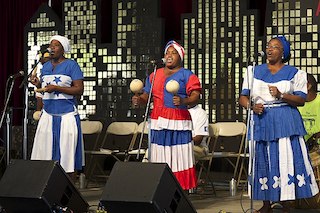The Umalali Women’s Collective consists of Bernandine Flores, Chella Torres, Damiana Gutierez, Desere Diego, Elodia Nolberto Fernandez Guity, Julia Nunez, Marcelina Masagu, Sarita Martinez, Alva Arana, Marcela Arana, Silvia Blanco, and Sofia Blanco. 1

Towards the end of his life, Andy Palacio and Wàtina producer Ivan Duran collaborated in order to bring together the Umalali (or voice) collective. In 1997, Duran began traveling to Garifuna communities across Belize, researching local cultures, interviewing women, and recording music. 2 After about ten years of research and recording, the Umalali Women’s Collective was born.
Umalali is a framework which showcases the raw talent of the Garifuna women who, for centuries, have acted as stewards of Garifuna song and culture. Cultural authenticity was central to this project in which most women had little experience with recording studios or performing on stage. 3 Duran even recorded portions of the album in more culturally organic settings like living rooms, kitchens, or temples. 4 Intergenerational by nature, many songs are intimately connected to the singer’s family and may be written by their mothers, grandmothers, or other relatives. The group even includes a mother-daughter duo, Sofia and Sylvia Blanco. 5 The songs of Umalali are deeply intimate, brimming with love, longing, and loss. The music often takes on a darker, more bluesy tone than punta rock, accompanied, of course, by the drum rhythms that structure Garifuna music. 6
In the song “Uruwei” (The Government) Bernadine Flores sings a song composed by her grandmother, Ola. In her lyrics, Bernadine refers to her children, Isabel and Nicho.
Anihan uruwei ya aü lahayahen nege lau le lisien
Nahayaruba gien bomou
Nahayaruba, wanwa, luba gudemetina
Haliyoun nibadina baume, Nicho
Haliyoun nibadina baume wanwa
Haliyoun nibadina beiba wabien
Haliyoun nibadina baume Isawelu
Haliyoun nibadina baume wanwa
Haliyoun nibadina beiba wabien
Haliyoun nibadina baume, nirau
Haliyoun nibadina baume, wanwa
Haliyoun nibadina beiba wabien
The government is here, hiring out of love they say
I will get a job
I will get a job for I am poor
Where shall I take you, Nicho
Where shall I take you, my dear
Where shall I take you? You had better go home
Where shall I take you, Isabel
Where shall I take you, my dear
Where shall I take you? You had better go home
Where shall I take you, my son
Where shall I take you, my dear
Where shall I take you? You had better go home
In this interview, Desere Diego, who is heavily featured on the album, touches on her origins as a singer and goals for the future.
Footnotes
- Ivan Duran, Liner notes, Umalali: The Garifuna Women’s Project, Stonetree Records, 2007, compact disc.
- Tom Pryor, “Off the Beaten Track: Umalali – “the Garifuna Women’s Project,”Sing Out! The Folk Song Magazine (Summer 2008): 120.
- “Umalali & the Garifuna Collective,” WOMEX, Piranha Arts AG, https://www.womex.com/virtual/cumbancha_putumayo/umalali_the_garifuna.
- “Umalali,” Stonetree, Stonetree Records, http://www.stonetreerecords.com/music/umalali/.
- Jon Kertzer, “Umalali: The ‘Voice’ Of The Garifuna,” NPR, Jan. 27, 2009, https://www.npr.org/templates/story/story.php?storyId=99877936.
- C. C. Smith, “Andy Palacio: The Pride of the Garifuna,” The Beat (2008). Accessed April 3, 2022.